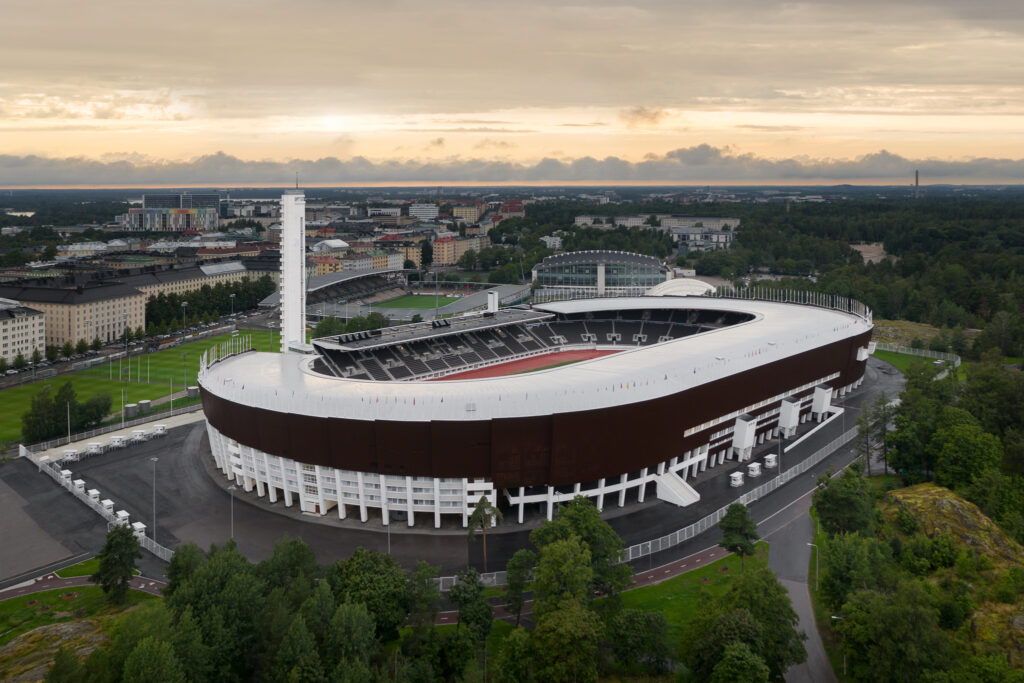
08.08.2024
Economic impact of the Helsinki European Athletics Championships 2030 Project: €64.0 Million
A study conducted as the foundation for Helsinki’s bid for the European Athletics Championships in 2030 estimates an economic impact of €64.0 million on the city.
The European Athletics Association (EA) will review summaries of Helsinki’s and other applicants’ projects for the 2030 Championships by the end of August. This review is part of the evaluation process, narrowing the current five applicants down to three. The EA Board will discuss the matter on September 3-4.
The bid study, conducted in the spring, details the effects that the Championships would have on the city of Helsinki and Finland if realised.
The study was commissioned by the Ministry of Education and Culture’s Sports Division and carried out by the Sport Business Research Unit of Jyväskylä University of Applied Sciences (Sport Business by Jamk) and the Major Sports Events in Finland project (SEMF). The report states that the European Athletics Championships 2030 would have an economic impact of €64.0 million on Helsinki. The project would also generate value-added tax and corporate tax revenue for the state.
“We value hosting high-quality, responsible, economically and socially sustainable, and environmentally friendly major sports events in Finland. The Olympic Stadium is an excellent venue capable of hosting top-level sports events,” says Hannu Tolonen, Special Adviser at the Ministry of Education and Culture.
According to Tolonen, the positive impacts of hosting major events, such as boosting the regional economy and fostering community spirit, are not yet fully understood in Finland.
“We have been systematically developing the principles for supporting sports event activities so that, together with event cities and sports organisations, we can better create regional economic impacts and enhance Finland’s attractiveness,” Tolonen continues.
“With preliminary impact studies like this, we aim to deepen the Finnish sports event culture and expertise while demonstrating the economic significance of the sector more effectively. The Finnish Athletics Federation is an experienced, skilled, and internationally highly respected event organiser.”
Spectator spending during the event: €65.9 Million
The economic impact summary in the study includes spending by event visitors and the event organiser. The study estimates that 100,000 individuals will attend the seven competition days in Helsinki: 25,000 being Helsinki residents, 60,000 other Finns, and 15,000 international visitors. On average, spectators are expected to stay for three to four days. Spectator spending during the event is estimated at €65.9 million.
The estimated economic impact of spectators is €44.0 million, excluding local spectators’ spending and travel costs to and from Helsinki. The organiser’s estimated economic impact is €20.0 million, resulting in a total estimated economic impact of €64.0 million for Helsinki.
“The study highlights the economic benefits of hosting the 2030 Championships for Finland. This is a clear message to decision-makers. Finland should host international major events through extensive cooperation,” says Riikka Pakarinen, Chair of the Finnish Athletics Federation (SUL).
“The preliminary report showed that to be competitive, we need a new cooperation model involving the City of Helsinki, ministries, the Olympic Stadium, the Finnish Broadcasting Company, the Finnish Athletics Federation, and other stakeholders.”
No major investments needed for the event in Helsinki
One of the key strengths of Helsinki’s bid is the competition venues. The study states that no major investments are required for the event, as the newly renovated Olympic Stadium offers versatile facilities for hosting the event, with nearby Eläintarha Field, football fields, and sports hall providing spaces for warm-ups and side events.
According to the study, Finland and Helsinki generally meet the criteria outlined in EA’s bidding manual, such as public transportation and accessibility.
“Helsinki is an experienced event city with a history of hosting various sports events and other large international events,” the study notes. This experience also applies to side events, which play an important role in the overall event package from the perspectives of the City of Helsinki, SUL, and EA.
“SUL and Helsinki have experience in organising large mass participation events, supporting the goal of societal inclusion. The importance of volunteer work as a societal phenomenon is also significant,” the study concludes.
“The economic impact of such an event is substantial, but sports events also have significant social, societal, and tourism impacts. Researching these short- and long-term effects already during the bidding phase helps both event organisers and funders understand the event’s opportunities, benefits, and risks,” says Aila Ahonen, Principal Lecturer at Sport Business by Jamk, who was responsible for the study.
“Finland is a pioneer in these studies compared to many other countries bidding for this event. Historically, Finland has been able to organise major athletics events with smaller budgets than many other countries,” says Harri Aalto, CEO of SUL.
“We know how to organise competitions more efficiently in Finland, and the culture of volunteer work plays a significant role in event organisation,” confirms the study.
Approximately 300,000 tickets are expected to be sold throughout the Championships, with ticket sales being a cornerstone of the event’s finances.
Major sports events strengthen Helsinki’s brand
According to the study, major sports events like the European Athletics Championships 2030 strengthen Helsinki’s international brand and are significant from a tourism perspective.
“Major sports events bring new tourists to the city, and their tourism impacts can be seen even years after the event,” the study states. The international television audience for the 2030 Championships in Helsinki is estimated at 729 million viewers.
__________
Source: Finnish Athletics / Helsinki EM 2030 press release, July 23, 2024
Picture: Wellu Hämäläinen, Helsinki Olympic Stadium
For more information:
Riikka Pakarinen, Chair, Finnish Athletics, riikka.pakarinen@sul.fi
Harri Halme, Project Manager, Helsinki EM 2030, harri.halme@welho.com